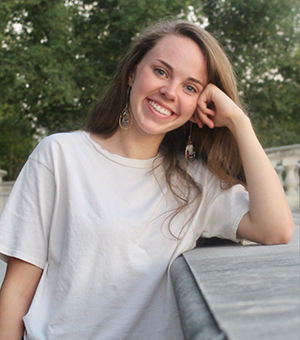‘Without the scholarship, I never would have been able to do it’
 Lindsey Grossheim graduated May 15 from the University of Missouri–St. Louis (UMSL) with a combined bachelor’s and master’s degree in philosophy — an impressive achievement by any standard.
Lindsey Grossheim graduated May 15 from the University of Missouri–St. Louis (UMSL) with a combined bachelor’s and master’s degree in philosophy — an impressive achievement by any standard.
Tenacity, hard work and a strong support system carried her through the rigorous program. But the BJC Scholars Fund scholarship was critical to making her academic accomplishments possible, Grossheim says.
“I want to offer a really big thank-you to BJC,” she says. The 21-year-old Alton, Illinois, native is one of six children and would have faced taking out a sizeable student loan to cover her tuition and expenses without the BJC scholarship. “The scholarship made school affordable. That was huge for me. It let me concentrate on school and pursue what sets my soul on fire.”
Grossheim was one of the original 14 students chosen in 2017 to receive the new scholarship — a needs-based award of up to $10,000 per year for students from the communities BJC serves. The annually renewable scholarship can be applied toward tuition, fees, room and board, transportation, and incidental costs for a two- or four-year degree at a public Missouri or Illinois state college or university.
The Scholarship Foundation of St. Louis administers the scholarship program, which is funded entirely by BJC as part of its social mission in recognition of the critical correlation between higher education, better health outcomes and greater longevity. At peak enrollment, more than 50 students are working toward their degrees as BJC Scholars, with students represented in freshman through senior classes. Like Grossheim, many among the first cohort of students will be celebrating graduation this year.
Grossheim was accepted into UMSL’s Pierre Laclede Honors College, a program with smaller, participation-based classes. She had entered college with a plan to study nursing. But a freshman philosophy class changed her path.
In the class, as students with a range of opinions debated each other, Grossheim realized that she enjoyed exploring moral and ethical issues where solutions are seldom black and white. “I’m okay with sitting in the gray area,” she says.
So she became a philosophy major focusing on medical ethics.
In addition to attending classes, she was able to shadow BJC hospital ethics committees and sit in during ethics consults. This experience, as well as interning as a phlebotomist at Alton Memorial Hospital and earning her EMT license, spurred her interest in “surrogate decision-making” — that is, making care and treatment choices for patients who are unable to make decisions for themselves. She wrote her master’s thesis on the topic, titled “Medical Expertise, Patient Expertise, and Surrogate Decision Making: The Importance of Deliberation in Medical Decision-Making.”
The COVID-19 pandemic — with ICUs full of patients on ventilators without family or friends allowed at the bedside — served as an object lesson of how important ethical guidance on surrogate decision-making can be, Grossheim notes.
She hopes to put her knowledge to work in a clinical setting after teaching at UMSL this summer and then taking a well-earned break from school.
Over the course of her college career, Grossheim, even before the pandemic turned the world upside down, wrestled with several challenges. A demanding academic load, as well as working as a resident advisor and philosophy department tutor, meant constantly having to manage time and stress.
“Stress management, for sure, was big for me,” Grossheim says. “Luckily, I have a powerful support network.”
She also had the BJC scholarship, so she didn’t have to stress over finances.
“Without the scholarship,” Grossheim says, “I never would have been able to do it.”
2010